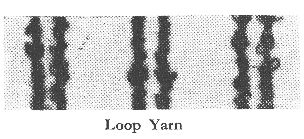- Loop Yarn
- LOOP YARNThis is the same as curl yarn.

Dictionary of the English textile terms. 2014.

Dictionary of the English textile terms. 2014.
Yarn over — In knitting, a yarn over is technique in which the yarn is passed over the right hand knitting needle. In general, the new loop is knitted on the next row, either by itself (producing a hole) or together with an adjacent stitch (e.g., in tucked… … Wikipedia
Loop knitting — In loop knitting, long, dangling loops are introduced into the middle of a knitted fabric or along an edge (fringe border). The loops may appear singly or in large clusters. An overall array of such loops may be used to give a shaggy look to the… … Wikipedia
Supreme Tex Mart Limited — Infobox Company company name = Supreme Tex Mart Limited company type = Public (NSE: [http://www.nseindia.com/marketinfo/equities/quotesearch.jsp?companyname=supremetex series=EQ ] ) foundation = 1996 As Supreme Woollen Mills Limited location =… … Wikipedia
knitting needle — long needle used to loop yarn together by hand … English contemporary dictionary
textile — /teks tuyl, til/, n. 1. any cloth or goods produced by weaving, knitting, or felting. 2. a material, as a fiber or yarn, used in or suitable for weaving: Glass can be used as a textile. adj. 3. woven or capable of being woven: textile fabrics. 4 … Universalium
Knitting — Knit redirects here. See also KNIT and Knitted fabric. Knitting is a method by which thread or yarn may be turned into cloth. Knitting consists of loops called stitches pulled through each other. The active stitches are held on a needle until… … Wikipedia
Casting on (knitting) — In knitting, casting on is a family of techniques for adding new stitches that do not depend on earlier stitches, i.e., stitches having an independent lower edge. In principle, casting on is the opposite of binding off, but the techniques… … Wikipedia
Crochet — For a note duration, see Quarter note. Detail of a crocheted doily, Sweden Crochet (English pronunciation: /k … Wikipedia
Textile manufacturing — is one of the oldest human industries. The oldest known textiles date back to about 5000 B.C. In order to make textiles, the first requirement is a source of fiber from which a yarn can be made, primarily by spinning. The yarn is processed by… … Wikipedia
Plying — In the textile arts, plying is a process used to create a strong, balanced yarn. It is done by taking two or more strands of yarn that each have a twist to them and putting them together. The strands are twisted together, in the opposite… … Wikipedia
Glossary of textile manufacturing — For terms specifically related to sewing, see Glossary of sewing terms. For terms specifically related to dyeing, see Glossary of dyeing terms. The manufacture of textiles is one of the oldest of human technologies. To make textiles, the first… … Wikipedia